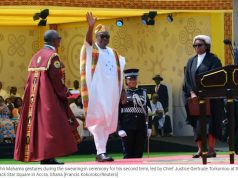Research analysts with Groupe Nduom have identified the need for government to strengthen and unify its policies to foster growth and development in the country.
According to them, though the economy can be said to have ‘attained some stability in 2017’ owing to the policies introduced in the 2017 budget, it still remains relatively ‘fragile and requires a lot more effort to yield better results in the coming year.
In a statement released by the GN Research team, they emphasized the importance of a clear update on progress made so far with some of government’s flagship policy initiatives including the Free SHS and One-District-One-Factory programs.
They also among other things recommended that government “introduces policies to widen the tax base by roping in the informal sector into the tax net and introduces measures aimed at generating more domestic revenue for its operations”.
Expectations are high as the country awaits the presentation of the budget statement for the year 2018 by Finance Minister, Ken Ofori-Atta on the floor of parliament on Wednesday November 15.
Ahead of that, analysts with GN Research have made some recommendations which according to them will boost growth and foster development in the country.
Below is the full statement
2018 budget must consolidate gains and propel rapid economic growth
Introduction
2017 budget in retrospect
In March 2017, the Minister of Finance, Mr Ken Ofori-Atta, presented the budget for the 2017 fiscal year which was dominated by tax reforms aimed at growing the private sector and debt management measures to create fiscal space for spending.
Other policies in the 2017 budget includes, One Village One Dam, One District One Factory, Free Senior High School Education ,US$1 million annually for all 275 constituencies under the Infrastructure for Poverty Eradication Programme (IPEP), the National Entrepreneurship and Innovation Plan (NEIP), Planting for Food and Jobs, National Industrial Revitalization Programme, the National Digital Addressing System and the establishment of a Fiscal Council, Zongo Development Fund and three Development Authorities; Northern Development Authority (NDA), Middle Belt Development Authority (MBA), and Coastal Development Authority (CDA).
Macroeconomic developments in 2017
Since the presentation of the 2017 budget, some key economic variables have improved. Inflation has declined from 15.4% in December 2016 to 11.60% in October 2017. Latest Economic and Financial data from the central banks puts Ghana’s debt as at June 2017 at GH¢138.6 billion representing 68.6 percent GDP as against GH¢122 billion (74% of GDP) at the end of 2016. The central bank has reduced the Monetary Policy Rate from 25.5% to 21% so far this year while interest on the 91day and 182day treasury bills rates have fallen from 16.84% to 13.20% and 18.5% to 13.83% respectively between December 2016 and October 2017. Consequently, the base rates of banks have decreased from the industry average of 27.5% in December 2016 to 26% in September 2017.
2017/2018 economy remains fragile
The Minister of Finance is expected to present the government fiscal policy for 2018 to parliament on Wednesday, 15th November 2017. As shown by the improvement in the macroeconomic variables, the economy has attained some stability in 2017 but remains fragile as these positives are not enough to drive high growth. Hence the need to do more and consolidate these gains.
Some initiatives in the 2017 budget (examples One Village One Dam, One District One Factory, Free Senior High School Education, US$1 million annually for all 275 constituencies and Planting for Food and Jobs) are expected to feature in the 2018 budget. It is however important that government gives a clear update on the progress made so far with these policy initiatives.
For instance, the Free SHS program faces funding and infrastructure challenges. Hence the need to know the current status of the policy. The expenditure on the policy is likely to be more than double for 2018. Unlike the 2017 budget, the 2018 budget should provide a clear plan for sustainable source of funding for the program. It should also address the infrastructure gap by providing the percentage of capital expenditure which government intends to spend on doing so.
According to the implementation plan of the one district one factory policy, about 51 factories should be established in 2017, 100 to 120 factories between 2018 and 2019. It is expected that the Minister will tell the nation if all the 51 factories have been established. If not, how many have been established or their level of completion. The same should apply to the one village one dam initiative. This policy is somewhat unclear making it difficult to measure its success or failure. How many villages are intended to be covered at the end of the four years? How many dams have been constructed or rehabilitated and in which villages? Answers to these questions should make it easier to monitor and evaluate the progress of the policy.
Debt management likely to focus on reducing the rate of borrowing
Ghana’s debt stock was 68.6% of GDP as at June 2017 which is above the sustainable threshold. The total public debt increased by about GH¢16 billion between January 2017 and June 2017. This is nearly double the amount within the same period last year. Between January 2016 and June 2016, the total public debt increased from GH¢ 100.2 billion to GH¢ 108.6 billion. Analysis of Bank of Ghana’s Economic and Financial data shows that the debt stock increased by an average of 2.1% per month in the first half of 2017 relative to 1.4% per month in the first half of 2016. Considering the need to have fiscal space to undertake critical government investments, government should focus on other source of revenue and limit the rate of debt accumulation.
Tax reforms to focus on tax base rather than the rate
Government budgets have faced implementation challenges due to shortfall in revenue and the 2017 budget is no exception. The tax reforms in the 2017 budget had a toll on government revenue collection which necessitated a downward revision of government revenue and expenditure estimates at the end of the first half of the year. Therefore, GN Research analysts expect government to introduce measures aimed at generating more domestic revenue for its operations. But we do not expect this to force government into introducing new taxes or increasing the tax rates on sectors that are over taxed. This could erode expected gains from the measures implemented via the 2017 budget.
Hence, GN Research analysts expect government to introduce policies to widen the tax base especially by roping in the informal sector into the tax net. One major obstacle which inhibited these measures over the years is identification. Now, the addressing system has been digitized via the Ghana Post GPS. Therefore the 2018 budget should be able to achieve more success in broadening the tax net. This is not to underestimate the complexity of increasing the tax base in an economy as ours.
Proposed ways to increase the tax base (new tax payers target, make paying ‘prestigious’ and easy)
Very practical measures should be introduced to increase the tax base and to increase domestic revenue. For a start, there should be a target for the number of new tax payers for the next fiscal year. This must take into account the existing number of tax payers in every region or district and the numbers of new taxpayers added during this year.
The budget should also announce measures that will make paying tax attractive. That is to make paying tax ‘prestigious’. For many, there are no advantages in paying tax other than scrutiny and doubtful enquiries from tax officials especially when they are unsatisfied with the level of development of their localities. Therefore recognising tax payers by honouring them in some way or the other by government should make many come forward to pay. For instance, benefits, such as priority in getting or renewing passports, driving licenses, permits, vehicle and company registration or extra services at airports, tourism centers, national events among others should be enjoyed by regular tax payers.
Aside this, paying tax must be made easy. The paper works and the bureaucracy must be reduced to the barest minimum for the average tax payer. The budget should include measures to explore the possibility of using Internet portals, mobile-payments systems and ATMs to collect or pay taxes.
This will reduce human interactions and reduce the length of queues at tax offices while eliminating barriers to compliance and corruption. This is why the idea of establishing a fiscal council is laudable. But so far, government has failed in constituting the council as promised in the 2017 budget.
The underlying factor for the successful implementation of every budget is the performance of the revenue side. But the quest to increase revenue should not override the need to consolidate the economic gains chucked and return to high economic growth path.
Therefore, the budget should demonstrate intent and ability to increase investor confident by improving the business climate. It should also show government’s commitment to continue to restructure the country’s debts and reduce the fiscal deficit and most importantly to achieve inclusive growth.
Signed
Samuel Kofi Ampah
General Manager
GN Research








